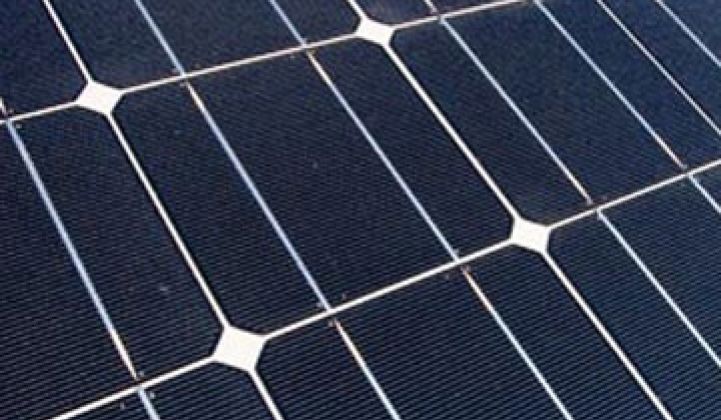According to an SEC Form D Document dated April 13, Suniva has raised $94 million of a $115 million venture round from investors NEA, Warburg Pincus, et al.
Our recent reporting on Suniva, loan guarantee news, and ion implant technology announcements follow.
***
Suniva is a fast-growing solar startup often held up as an example of American innovation, an illustration of how venture capital can be well deployed, and vindication of the Administration's stimulus program.
Last week, Scott Stephens of the DOE's Loan Guarantee Office told me that Suniva was "suspending" its efforts to close on a loan guarantee because of the company's displeasure with the DOE's terms and conditions. (Stephens was a panelist at Greentech Media's Solar Summit in Palm Springs.)
Suniva uses a number of different cell structures and processes to build a high-efficiency crystalline silicon solar cell. The firm has long had plans to build a factory in Michigan, and in an interview with Greentech Media last month, Suniva’s CMO, Bryan Ashley, said that the firm was "not planning to leave the U.S." But the refusal to accept the DOE loan guarantee might impact the location of the heralded startup's factory, as much of the construction was contingent on receiving the $141 million loan.
Venture Wire reported today that Suniva had "put on hold its plans to build a new solar cell factory in Michigan." The blog was reprinted in the Wall Street Journal. Tom Cheyney broke the loan guarantee story last month in PVTech.
This is an abrupt about-face from Suniva, which had ruffled some DOE feathers by jumping the gun in prematurely announcing the finalization of the DOE loan a few months ago. The DOE loan program is under fire from Fred Upton (R-Michigan), House Energy and Commerce Committee Chairman, who has initiated an investigation into possible misuse of stimulus funds. That would include the $535 million stimulus loan guarantee for Solyndra of Fremont, California.
Suniva is venture funded by Advanced Equities, Goldman Sachs, HIG Ventures, New Enterprise Associates and Warburg Pincus.
***
Following Evergreen’s solar factory closing and President Obama’s State of the Union, the solar industry is buzzing with stories about how manufacturing firms cannot survive in the U.S. given the cheaper labor and government subsidies in China.
Looking to buck this trend is Suniva, a solar manufacturer headquartered in Norcross, Georgia, USA that is growing fast and which serves as a good example of how innovation can make a difference. VC-funded Suniva uses a number of different cell structures and processes to build their high-efficiency cell.
Suniva's newest line of solar cells is achieving conversion efficiencies of more than 19 percent -- what the firm claims is a record for screen-printed cells in full-scale production.
Suniva is the first PV manufacturer to successfully leverage ion implantation, a technology widely used in semiconductor manufacturing, in the mass production of solar cells. By employing this technology, Suniva claims the ability to compete with high-efficiency PV manufacturers such as Sunpower (NASDAQ:SPWRA) as well as with low-cost, lower-efficiency Asian manufacturers. The firm looks to balance the trade-off between cost and efficiency.
Suniva reaches these efficiencies using a uniform single-sided emitter, along with other proprietary innovations, on the front side of the cell. The use of a customized ion implantation step in Suniva’s manufacturing process is based on years of development collaboration with Varian Semiconductor (NASDAQ: VSEA).
We looked at Varian's efforts to develop ion-implant technology for solar firms here. Varian, headquartered in Gloucester, Massachusetts, believes it can bring a Moore's Law-like momentum to solar. Varian supplies ion implantation equipment to most of the major semiconductor manufacturers in the United States, Europe and Asia. Revenue in the firm's most recent quarter was $227.7 million.
According to Jim Mullin, the Vice President and General Manager of Varian's solar group, 90 percent of crystalline silicon cells are the same product made on the same equipment. Varian is looking at a way to fundamentally change the c-Si cell itself. Mullin suggests that the silicon solar cell "is essentiality just a diode" with a semiconductor junction. And the quality of that junction determines the quality of the cell.
Paul Sullivan, Varian's Vice President of Business Development, said, "We can remove two of the six steps and at the same time improve the efficiency of the cell." Varian envisions 18-month, semiconductor-type process improvement cycles finally reaching solar and bringing at least a hint of Moore's law to this industry.
Shyam Mehta, Greentech Media Research's Senior Solar Analyst, has provided an analytical framework in which to examine the solar industry's more than 200 module manufacturers. (See his recent report, PV Technology: Production and Cost Outlook 2010 to 2015, for more details.) He parses these many players into "facility archetypes," as broken out in this chart:
Not included in this list is the class of "Super-mono," which includes Suniva, SunPower, Sanyo, Suntech, developments from Yingli and Trina, as well as the Innovalight-enhanced cells from JA Solar and others. Mehta goes into more detail here.
I spoke with Suniva’s CMO, Bryan Ashley. He said that Suniva is "the world's first [solar manufacturer] to use ion implantation in production," adding, "We are the first to have a production machine. We have worked with Varian for the last two years." According to Ashley, the current range of cell production is 18.4 percent to 19.1 percent and the entire plant is being switched over to this new process. Those cell efficiencies work out to about 16 percent when incorporated into modules.
Suniva's next generation technology developments include n-type cells and selective emitter technology -- with a roadmap to reach 22 percent cell efficiency through a combination of ion-implantation and other cell architectures. The current factory has a capacity of 170 megawatts and the planned next factory is "much bigger." Ashley did not disclose manufacturing costs.
Ashley added that Suniva is now going through UL approval of the modules that incorporate the new cells. He also insisted that Suniva was "not planning to leave the U.S."



